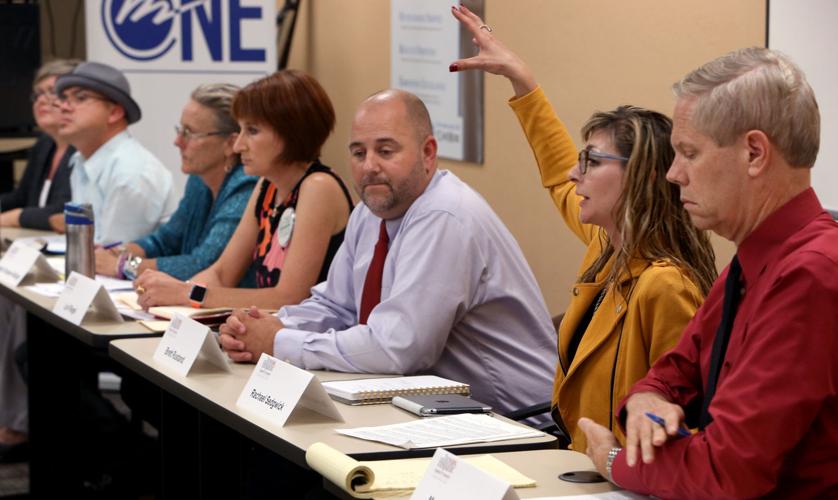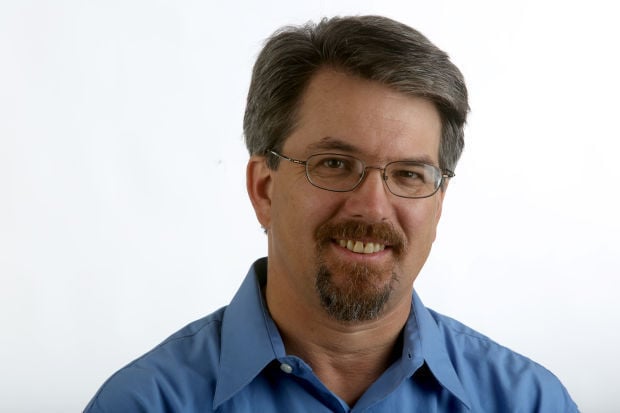It used to be that if the League of Women Voters or the local TV station called up to schedule a debate, candidates found a way to put it on their calendars.
They could quibble about details of date, time and location, but in general, they debated.
That was part of being a candidate — opening oneself up to personal public scrutiny and even questions directly from the public or an opponent. Not always comfortable, but it usually was informative for the voters whom the candidates are, after all, asking for their votes.
No longer. Now candidates are treating debates as optional.
Perhaps the most prominent example this fall: The race for Pima County sheriff.
Republican challenger Mark Napier has said he’s willing to debate wherever, whenever. The Democratic incumbent sheriff, Chris Nanos? Not so much.
Nanos went back and forth in deciding whether to attend a candidate forum scheduled for this Saturday and sponsored by the Green Valley News, editor Dan Shearer reported.
“Nanos’ campaign seemed a bit surprised at the request but said yes over the phone. Then they said no.”
“Then yes. Then no again.”
After another yes, the final answer was no, he reported.
There are explanations, of course. Nanos and Napier had an ugly discussion at the Star’s editorial board meeting, one Nanos told me he doesn’t want to repeat.
And Nanos disliked that Napier criticized him publicly for not debating, labeling him an “appointed” sheriff in a disparaging way (though of course that’s what Nanos is, having been appointed by the Pima County supervisors in 2014).
But this isn’t just about Nanos and Napier. Increasingly, it seems, candidates are opting out of debates.
“When I came here in 1988, it was just assumed that everybody would do debates,” radio host and longtime public-television anchor Bill Buckmaster told me Tuesday. “On Arizona Illustrated, we invited all the major candidates. It was highly unusual for anybody to skip it. If anybody did skip, it became a big story.”
These days, incumbents, especially, tend to see more risk than reward in exposing themselves to the uncertainty and onstage equality of a person-to-person debate. It lowers the incumbent’s profile to the level of the challenger.
Incumbent Pima County Supervisor Ally Miller, a Republican, is refusing to acknowledge Democratic challenger Brian Bickel or any of the usual local interviews — Star editorial board, Arizona Public Media’s Metro Week, etc.
But then there are challengers who also, somewhat inexplicably, take this tack. Ana Henderson, the Republican challenging for a state House seat in Legislative District 9, declined to show up for the Star’s editorial board or for a candidate forum on Sunday, sponsored by the Pima County Interfaith Council.
Henderson, and her Democratic opponents, Pamela Powers Hannley and Rep. Randy Friese, are scheduled to appear at the Arizona Citizens Clean Elections Commission debate at 6 p.m. Oct. 14 at Pima Community College’s northwest campus, 7600 N. Shannon Road. Henderson and Powers Hannley have to, because they are taking public money for their campaigns through the clean-elections system.
Publicly funded candidates face a $500 fine if they don’t show up for their clean elections debate. It’s not a huge deterrent, but the vast majority do show up.
In fact, the clean elections debates have become a sort of backstop event, even though only 37 of 144 legislative and Arizona Corporation Commission candidates are taking part in the system and obligated to appear. If no other debate gets put together in those races, at least the clean-elections one does.
That doesn’t help for the higher- or lower-level offices, though.
So far, no local debate is scheduled between the candidates for U.S. House in Congressional District 2, which covers the eastern Tucson area and much of the rest of southeastern Arizona. Republican incumbent Rep. Martha McSally will face Democratic challenger Matt Heinz Oct. 12 at Buena High School in Sierra Vista.
But a debate scheduled for Vail Wednesday has been postponed and not rescheduled because Heinz said he could not attend. Organizers are looking for a new time. Heinz, on the other hand, did attend Sunday’s candidate forum, but was not permitted to speak because McSally had said she would not attend.
The timing issue reveals another pressure causing debates to diminish: early ballots. The fact that voters get their ballots by mid-October means organizers have about three weeks less time to put on their event. The longer you wait after voters get their ballots, the fewer people who will be paying attention.
I don’t expect the trend to reverse, though. Pima County Attorney Barbara LaWall, a Democrat, avoided debates with challenger Joel Feinman in the primary season, although they did appear at a couple of candidate forums. She won the primary handily.
In 2014, Arizona Superintendent of Public Instruction Diane Douglas, a Republican, avoided all but one of a half-dozen possible debates with Democrat David Garcia. She won anyway.
The only encouraging counterpoint to the trend is the race for Tucson Unified School District board. There had already been three debates before Tuesday night, when a fourth occurred.
To encourage that trend, the best thing we can do is to vote for the people who show up, make themselves available and, yes, vulnerable to the risk of a debate. The exchange that happens there keeps our system vital.





